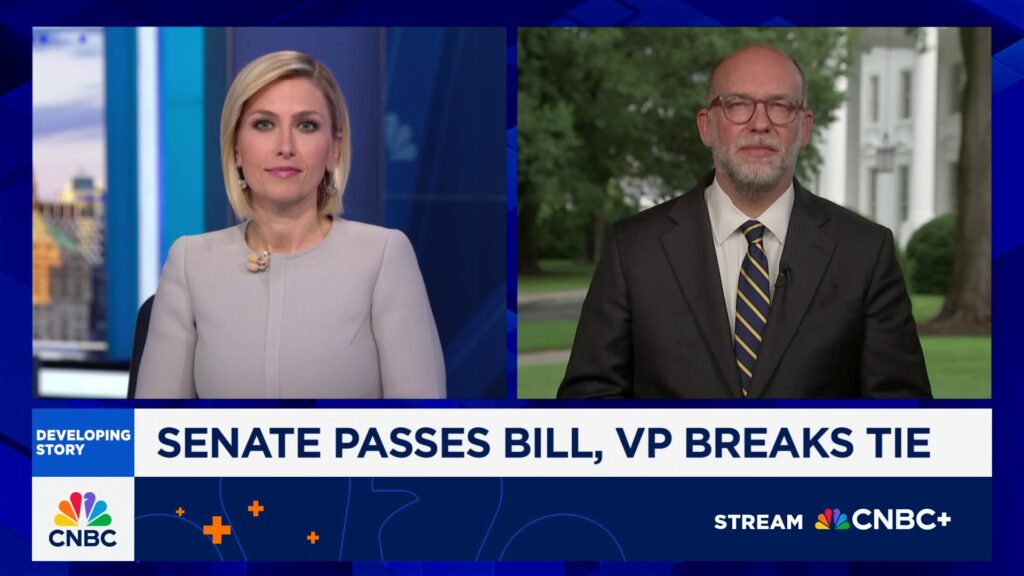In a recent appearance on CNBC’s ‘Closing Bell Overtime,’ Office of Management and Budget Director Russell Vought delved into the intricacies of President Trump’s newly passed mega-bill in the Senate. Vought highlighted the bill’s potential impact on the national debt and deficit, as well as the challenges it faces in the House of Representatives.
The passage of this significant legislation marks a pivotal moment in the Trump administration’s fiscal policy. Vought emphasized the importance of the bill, noting its potential to reshape financial priorities amidst ongoing economic challenges. “This bill is a cornerstone of our economic strategy,” Vought stated, underscoring the administration’s commitment to economic growth and stability.
Impact on Debt and Deficit
The mega-bill, which passed the Senate with a narrow margin, aims to address several pressing economic issues. However, it has also raised concerns about its implications for the national debt and deficit. According to Vought, the administration is aware of these concerns and is taking steps to mitigate potential risks.
Financial experts have expressed mixed reactions to the bill’s passage. While some see it as a necessary step to stimulate the economy, others warn of the long-term fiscal implications. “The bill’s provisions could lead to an increase in the deficit,” said Dr. Jane Thompson, an economist at the Brookings Institution. “It’s crucial that the government carefully manages its spending to avoid exacerbating the debt situation.”
Challenges in the House
Despite its passage in the Senate, the bill now faces a tough battle in the House of Representatives. Vought acknowledged the challenges ahead, citing partisan divisions as a significant hurdle. “We anticipate robust debate in the House,” he remarked, “but we are confident in the bill’s merits and its potential to drive economic recovery.”
The House’s response will be crucial in determining the bill’s future. Historical parallels can be drawn to previous legislative efforts that faced similar challenges. For instance, the Affordable Care Act experienced a contentious journey through Congress before its eventual passage.
Expert Opinions and Historical Context
Experts suggest that the current economic climate requires bold measures, but caution is needed to ensure fiscal responsibility. “This is a delicate balancing act,” said Professor Mark Reynolds of Harvard University. “The administration must weigh immediate economic benefits against long-term fiscal health.”
Historically, large-scale economic bills have often sparked debate over their potential impact. The 2008 financial crisis, for example, led to significant legislative efforts aimed at economic recovery, each with varying degrees of success and controversy.
“The national debt is a concern, but strategic investments can lead to sustainable growth,” Reynolds added.
Looking Ahead
As the mega-bill moves to the House, its proponents remain optimistic about its prospects. The administration is actively engaging with lawmakers to garner support and address concerns. “We are committed to working with Congress to ensure the bill’s success,” Vought affirmed.
The outcome of this legislative effort will have significant implications for the U.S. economy. If passed, the bill could pave the way for further economic initiatives, potentially reshaping the nation’s fiscal landscape.
Meanwhile, the debate continues, with stakeholders from various sectors weighing in on the bill’s potential impact. As the House prepares to take up the legislation, all eyes will be on the unfolding political dynamics and their implications for the future.
About The Author
 EA’s Skate Revival: Online Connection Needed, But No PS Plus or Xbox Game Pass Required
EA’s Skate Revival: Online Connection Needed, But No PS Plus or Xbox Game Pass Required Jury Deadlocked on Key Charge in P. Diddy Trial as Deliberations Continue
Jury Deadlocked on Key Charge in P. Diddy Trial as Deliberations Continue UK YouTubers Call for Government Recognition and Support for Digital Creators
UK YouTubers Call for Government Recognition and Support for Digital Creators Trump’s Tax Bill Impact, VA Morale Crisis, and Polar Explorations
Trump’s Tax Bill Impact, VA Morale Crisis, and Polar Explorations Milo Manheim Hopes to Break ‘Zombies’ Curse on ‘Dancing With the Stars’
Milo Manheim Hopes to Break ‘Zombies’ Curse on ‘Dancing With the Stars’